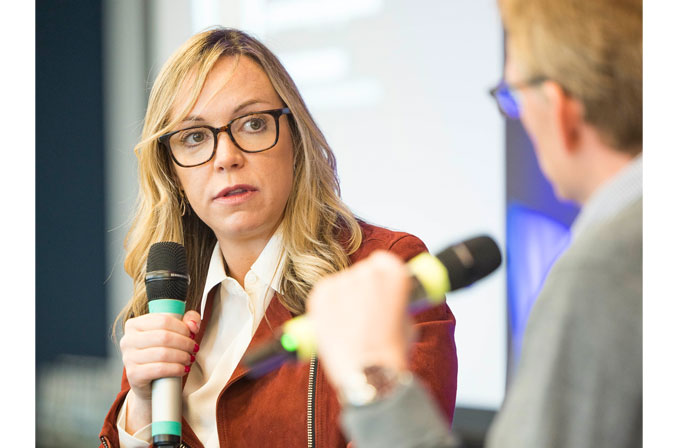Sky has shared some of the details of its Sky Glass international syndication programme, including what services the Pay TV operator provides to syndication partners, and the control that partners have over the UX they create in their own markets. Michelle Reglinski, Managing Director, International Syndication at Sky, confirmed that third-party operators enjoy 100% of the features and functionality available to Sky in the UK and Ireland. Sky acts as the systems integrator, providing a full managed service to span everything from the apps an operator wants as part of its super-aggregation to the languages covered, and technical processes like metadata integration.
Sky Glass is the revolutionary go-to-market concept that puts the Sky entertainment OS inside a private-labelled Smart TV, removing the need for a set-top box (and removing the requirement for a satellite dish, as it is a streaming-only solution). But Reglinski emphasised that Sky Glass is an experience that can be replicated on multiple endpoints, including streaming puck set-top boxes like Sky Stream. This device takes the Sky Glass UX onto any television set via HDMI.
Where a syndication partner intends to deliver the entertainment OS inside its own Smart TVs (the ‘Smarter than a Smart TV’ vision articulated in current UK consumer advertising), they order the television hardware via Sky, which leverages its now established supply chain. “The experience can be on Sky Glass hardware or Sky Stream – and we can look at putting the experience onto other compatible devices,” Reglinski reveals.
“[Syndication partner] operators can bring their own content, apps and their own brand to the experience. Very importantly, they retain the customer relationship and the billing relationship with their customers, and they are in control of the data and the monetisation of the platform,” Reglinski explained. “The integrations can be very bespoke, depending on the operator, but obviously there will be localisation [e.g., language, content, apps]. They might want a mobile companion app. Often operators want to control how they show content, how it is merchandised, and there is a lot of flexibility in the editorial tooling.”
Sky Glass is powered by the Comcast Global Technology Platform, which is also common to Xfinity X1, Xfinity Flex (the streaming-only box that is bundled with broadband in the U.S.), Sky Q and XClass TV. XClass TV is another example of how a Pay TV operator builds its OS into a Smart TV, only this time it is the Comcast entertainment UX, and it is a third-party branded Smart TV maker that provides the hardware (i.e., Hisense models in the U.S.), sold in retail stores without the need for an Xfinity subscription (including outside of Comcast’s geographic service footprint).
Reglinski pointed to the scale of the Comcast Global Technology Platform: 75 million [broadband and streaming] connected devices are running off this now, with 40m voice commands processed a day, as an example of scale for just one advanced feature (voice search and command). The American MVPD Cox and the Canadian BDUs Shaw, Rogers and Videotron are already syndication partners for the Global Technology Platform, with Cox making use of the X1 OS/UX since late 2015.
The Syndication of Sky Glass has already begun, with Foxtel in Australia and Multichoice in South Africa signed up. “Foxtel was the first and they signed up even before the Sky Glass launch in the UK,” Reglinski confirms. “We are currently in the process of getting them onto the platform.”
Why is the Sky/Comcast group syndicating Sky Glass in the first place, given it has significant scale for its tech platform and development already? According to Reglinski, “A lot of Pay TV operators and telcos face the same challenges we do, and there is an opportunity for global MVPDs [Pay TV operators] to power their entertainment and connectivity services via our platform. We are excited by the chance to bring this [Sky Glass] experience to as many consumers as possible.
“Secondly, platform scale benefits everyone. The more investment we make in our platform the more innovation we can drive, and the more consumers and operators benefit globally.” She says syndication partners find this appealing, given the need to keep ahead of consumers, who are becoming more demanding.
“It is important that this is not a standard technology relationship,” she added. “We are developing true partnerships here, and the [syndication] customers we bring into our system want flexibility, including how they talk to their consumers, and they get quite a lot of control on how that is done.”
Reglinski views the Sky Glass model as a new market opportunity for syndication partners. “We’ve learnt from our own markets that if you launch a proposition that is rooted in true consumer insight and simplicity and you take that to market in a way that talks to consumers, you can break into a new segment and drive customer satisfaction. There are lots of learnings from the Sky and Comcast go-to-market approaches and operators are really interested in us sharing those learnings and helping them to drive their business objectives.
“This is not a point-in-time purchase – you are buying into a roadmap and benefit from all the investments and innovations that we introduce for our own consumers over time. Even in ‘live’ we get unique requests from partners, and we consider those as we develop the platform. And of course, there is live operational support.”
Michelle Reglinski was speaking at Connected TV World Summit.


